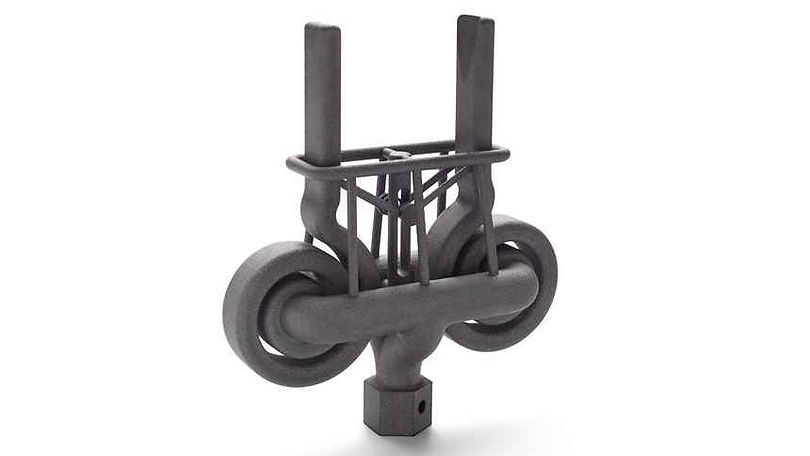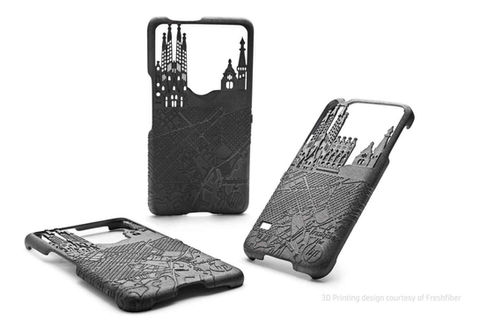Why Choose Nylon PA11?
Nylon PA11 is a bio-based polyamide derived from renewable castor oil, making it both high-performance and sustainable. Compared to PA12, it offers greater ductility, higher impact resistance, and superior elongation at break — ideal for parts that require flexibility and toughness under stress.
Certified biocompatibility expands its use in medical and wearable applications, while its durability and chemical resistance make it a strong choice for industrial and consumer goods.
3D printing technology
Dimensional accuracy
+/- 0.3% with a lower limit of +/- 0.3 mm
Maximum build size
380 x 285 x 380 mm (14.9" x 11.2" x 14.9")


Designed for Real-World Performance
Nylon PA11 offers a unique combination of mechanical strength, flexibility, and environmental sustainability. Its excellent impact resistance and ductility make it ideal for parts exposed to dynamic stress, vibration, or repeated flexing.
Industries trust PA11 for orthopedic devices, prosthetics, automotive housings, protective gear, and consumer products where resilience and long-term performance are essential. As a bio-based material, PA11 also helps businesses meet sustainability and regulatory goals without sacrificing quality or reliability.
Key Benefits
-
Tough and Flexible – High elongation at break and excellent impact resistance for parts that need to bend without breaking.
-
Chemical and Environmental Resistance – Stable against light, UV, and weather exposure with strong resistance to oils and greases.
-
Sustainable Material – Derived from renewable castor oil, offering reduced environmental impact compared to petroleum-based plastics.
-
Biocompatible – Safe for skin-contact applications such as medical and wearable devices.
-
High Accuracy – Produces strong, isotropic parts with fine detail and consistent repeatability.
Applications
-
Medical and Wearables – Prosthetics, orthotic devices, insoles, and skin-contact components.
-
Consumer Goods – Sporting equipment, snap-fits, living hinges, and protective gear.
-
Industrial Components – Moving parts, housings, holders, and adapters requiring durability and flexibility.
-
Prototyping and Production – Functional prototypes, low- to mid-volume end-use parts, and intricate designs with complex geometries.
-
Cross-Industry Use – Trusted in healthcare, automotive, aerospace, consumer products, and education.

HP Multi Jet Fusion (MJF) delivers exceptional precision and surface quality for end-to-end production at low cost. Ideal for low- to mid-volume manufacturing, it’s trusted by global leaders including Volkswagen, BMW, and John Deere for producing durable, high-performance production-grade parts.
Technical Specifications
Accuracy
+/- 0.3% (minimum of +/- 0.3 mm)
Layer thickness
0.08 mm
Density of part
1.04 g/cm³
Tensile modulus
1800 MPa
Tensile strength
52 MPa
Elongation at break
50% (XY), 35% (Z)
Flexural strength
70 MPa
Flexural Modulus
1,800 MPa
Hardness (Shore D)
1800 MPa
Melting temperature (20°C/min)
201°C
Heat deflection temperature (1.82 MPa)
50°C
Heat deflection temperature (0.45 MPa)
157°C
Softening temperature
189°C
Datasheets
Design Guidelines
Max build volume
380 x 284 x 380 mm (15 x 11.2 x 15")
Min wall thickness
0.6 mm (flexible), 2 mm (rigid)
Connecting parts
min 0.5 mm between part interface areas
Moving parts
min 0.7 mm between faces of printed assemblies
Emboss / deboss
min 0.5 mm
Design Considerations
-
Thin and long parts, as well as large flat surfaces, may be prone to warping. We recommend Select Laser Sintering as an alternative material for these parts.
-
Consider hollowing or adding internal lattice structure to large solid pieces to improve accuracy and minimize cost.
-
Hinges, sockets, and linked parts can be integrated into the design.
Case Studies
OT4 Creates 3D printed hand brace to provide flexible yet sturdy support
Bowman achieves easier, faster manufacturing of 3D printed bearings cages
Surface Finishes
.jpg)
Raw (gray)
After the part has been printed it has a powdery gray look and feel. This finish is best suited for functional prototypes and non-visible parts.

Black Dye
Parts are submerged in a hot dye bath containing dye pigment. This gives a smooth, consistent finish with no loss of dimensional accuracy.

Cerakote
Cerakote is a thin-film ceramic coating applied to 3D printed parts to improve looks and functionality. A variety of colors are available.

Vapor Smoothing
A chemical vapor is used to smooth the surface of the part. Vapor smoothing can also enhance material properties and water resistance.








.jpg)
